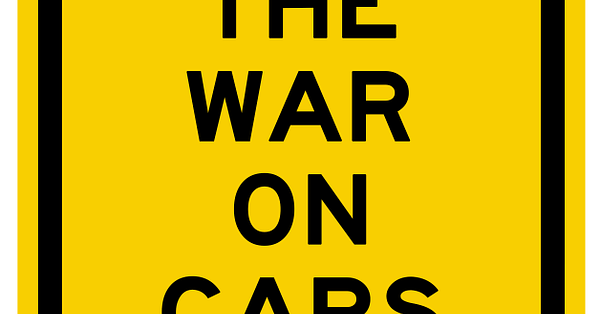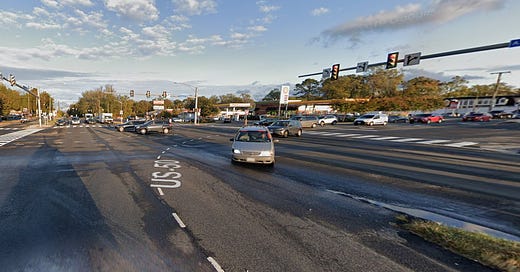If You Build a Speedway, They Will Speed
Musings on traffic safety and the individual versus the collective
Between a recent War on Cars podcast featuring a motorist who (accidentally) killed someone, and a little Twitter exchange on the topic of motorist responsibility, I’ve been thinking a lot about this.


Over the years on Twitter, I’ve observed an interesting tension here, or even a reversal from what you might expect. To simplify a little, conservatives tend to think about problems through an individualist lens: if we want X outcome, individual people should work towards it. Progressives tend to view problems collectively: if we want X outcome, taxes, laws, or regulations should be bents towards producing it.
When it comes to this question of safe driving, however, a subset of Twitter urbanists and safety advocates take a very...conservative approach. They often focus on the harm and damage caused by motorists, in a way that feels a little like trying to induce guilt, even preemptive guilt. It almost feels like there’s an attempt to implicate all motorists, as motorists, in the death and damage caused by cars.
I think this is an ineffective way to approach the issue. Some people will allow themselves to be moved by this kind of thing. Others will find it either too difficult to face and ignore it, or find it emotionally manipulative and resist it. In general, I don’t see it changing the road safety landscape.
And if I’m being honest, I don’t want to think about the harm I might cause as a driver. I don’t like the idea that something so ordinary is so consequential. I don’t like the idea that I’m putting myself in the terrible position of possibly killing another person every time I drive to the store. And yet, I am. Am I being uncharitable if I acknowledge this, yet dislike having someone else tell it to me? Maybe. But I think I’m also reacting the way the vast majority of people would react.
I care very much about the safety of non-motorists—I have to credit lefty urbanists for this, to some extent—and I drive about as responsibility as it's possible to drive on roads as they exist. More importantly, perhaps, I support changes in speed limits and street design which might inconvenience me as a driver but which would enhance safety for other users of the road.
When it comes to driving, my father used to emphasize that speed kills. He didn’t say this because he was a progressive urbanist. He said this because it is true. It’s something individual motorists should take to heart. But it should also be the motto of traffic engineers and road designers. (It isn’t, of course. More like the opposite.) Traffic engineers are communicating to us, through their designs, that we should drive irresponsibly; that pedestrians and cyclists are secondary; that crashes are inevitable and acceptable. If you build speedways, drivers will speed. They shouldn’t, but they will. They’re responding logically to their incentives and surroundings.
And so my own tendency—which I share with Strong Towns and others who have the same priorities but don’t come at them from a left-progressive angle—might actually seem more typically “progressive” than “conservative.” The progressive activist focus on individual motorists over reckless traffic engineers is almost like the story of corporations’ focus on littering over their own environmental irresponsibility.
But let me not go too far. I’m not saying motorists are blameless, and I’m not saying individual responsibility is irrelevant. But incentives and policy can make it much harder or easier to be responsible. Slow streets are safe streets, so if we want safe streets, we should make them slower. There’s nothing ideological or left-wing about that. As a conservative and a motorist, I’d ask other conservatives and motorists to get behind it as well.




I know someone who works at Tesla, and he reckons driverless cars will be the norm within a decade. That might well render this entire debate moot.
I think the new urbanists who otherwise have contributed such good ideas about urban livability have taken a seriously wrong turn with their attitude to cars. I'll stipulate that they're responsible for so much blight in the form of parking lots, gas stations, highways, etc., but there is never any turning back the clock on technology. Just as importantly, I have lived in carless cities, car-essential cities, and several in between, and being able to go shopping and stuff a bunch of things in the back of your car is a fairly essential quality-of-life convenience. Likewise being able to drive to work in your own clean car instead of taking a multi-legged commute with filthy, overcrowded public transportation with multiple line switches in the middle is a such a huge quality-of-life upgrade to anybody who has ever commuted by subway or bus that the only thing I can analogize it to is the feeling of your first healthy day after getting over the flu. Insisting we should just build better rail systems that *aren't* filthy, inconvenient, and overcrowded isn't any more persuasive than suggesting we can just build better road systems that aren't as blighted or dangerous - as long as we're reimagining everything from square one, there's no reason we can't imagine better ways to integrate cars while retaining what we love about the pre-automobile environment. And that seems more likely to lead to positive change people can get on board with than telling them they're going to have to find a way to carry their family groceries or new sofa home on the subway.